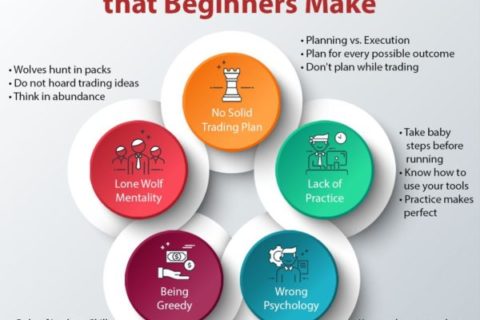Up your skill
Be Prepared
Before you open your first trade, there’s potential to make a couple of common mistakes. And as these are easily controllable, there’s no reason to be caught out. It’s essential to be well prepared. You can find a whole host of information and learning resources out there, in the form of books, educational courses, trading conferences and, of course, the Internet. Despite this, far too many people rush in without performing the necessary due diligence on whether it’s a prudent move. The financial markets can be particularly unforgiving of naivety and especially punishing of over-confidence. Take the time to understand the markets you are interested in, how they work, and how they have been behaving. When it comes to being fully prepared, however, the most important thing to comprehend is yourself. Be sure to understand how you work, what you want to achieve, and what you need to do to reach your objective. In developing a trading plan, we talk about what type of a trader you are, and how you can better understand the strategies that might suit you best.
Test Your Skills
Are you ready to trade? Testing your systems and plan in our trading simulator and challenge environment will be a great benefit. Can you follow your signals without hesitation? Trading in the markets is a constant battle of give and take. The real pros are prepared, and they take their profits from the rest of the crowd who, lacking a plan, give their money away through costly mistakes.
Remember the role that your emotions and personal psychology can play in trading. It is important for you to assess how you feel each day before you get started. Body and mind work hand in hand. So take a personal inventory – Do I feel physically healthy or under the weather? Did I get enough sleep? Am I angry, frustrated, resentful, depressed, or dealing with other issues today? Trading on a day when you are less than one hundred percent could have negative consequences as trading requires your complete concentration. Sometimes the best decision is to take that type of day off and come back when you are primed to tackle the markets and the decisions required of you.
Before the market opens, what is going on around the world? Are overseas markets up or down? Are index futures such as the S&P 500 or Nasdaq 100 up or down in pre-market? Foreign Exchange markets and energy and metals trade around the clock. What economic or earnings data is due out and when? Post a list on the wall in front of you and decide whether you want to trade ahead of an important economic report. For most traders, it is better to wait until the report is released than take unnecessary risk.
It is extremely important to recognize that it will take time to become successful. Think about any endeavor with which you’ve struggled to develop expertise—playing an instrument, learning how to shoot a jump shot, speaking a foreign language, or obtaining an academic degree—and remember all the hours, weeks, months, or years it took to become proficient.
The emerging picture… is that 10,000 hours of practice is required to achieve the level of mastery associated with being a world-class expert–in anything. In study after study of composers, basketball players, fiction writers, ice skaters, concert pianists, chess players, master criminals and what have you, the number comes up again and again. Of course, this doesn’t address why some people get more out of their practice sessions than others do. But no one has yet found a case in which true world-class expertise was accomplished in less time. It seems it takes the brain this long to assimilate all that it needs to know to achieve true mastery.
I’m sure your mom, dad, or a teacher told you at some point that practice makes perfect; well in trading it may not make you a winner every time but it sure does help you to hone your skills and to perfect your trading style and strategy.
Hit the books! Set aside time to study when you have no other distractions. It is preferable if you can find a few hours during the trading day for this, but you should do it even if you can only find the time after market hours. Just like anything that you want to commit to (e.g., exercise), schedule the time on your calendar now – make an appointment with yourself.
KISS – Keep it simple stupid (or sweetie!) Develop trading strategies that do not require your constant attention. For example, rather than focus on taking quick profits and losses, you can attempt to stay in a trending market by trading very small positions, using relatively wide stop loss parameters, and exiting with a profit only when the trend has reached your predetermined risk-reward exit point. In a market that is trending well, your position may last for weeks or even months.
The best thing that anyone can do when starting out is to learn how a trend system works. Trading a trend system for a while will teach a new trader the principle of letting profits run and cutting losses short. If you can just learn discipline by using a trend-following system, even temporarily, it will increase your odds of being successful as a trader.
Establish performance measures to gauge your success. The Trade Log is a great resource for measuring your performance on an on-going basis. Remember the idea is to develop a sustainable methodology that fits your goals and needs.
Measurement is the first step that leads to control and eventually to improvement. If you can’t measure something, you can’t understand it. If you can’t understand it, you can’t control it. If you can’t control it, you can’t improve it.- H. James Harrington
Keep a detailed trading diary. This is a good exercise for any novice trader, but especially important for someone who cannot be watching the markets constantly. Maintaining a diary will force you to think about the market in an analytical way. It will also force you to monitor and assess your progress on a regular schedule.
A diary can be an old-fashioned notebook or you can use any of the many electronic versions or apps currently available. Our trading platform has the ability to log your trades and comment on them.




